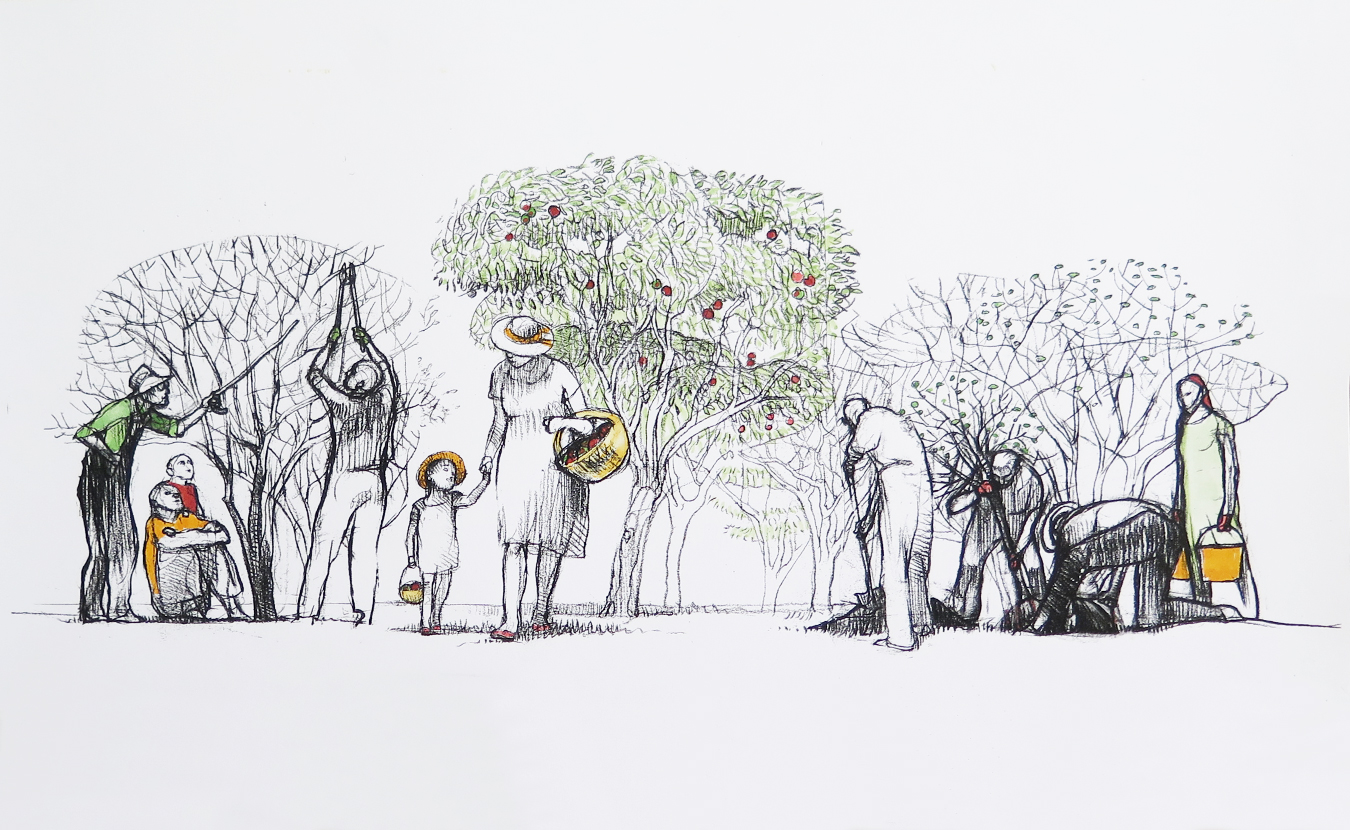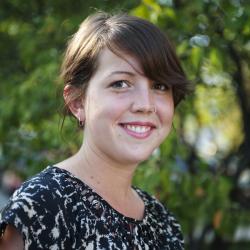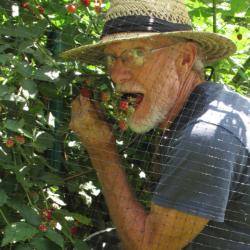Across the road from the south-side YMCA, peaches move from green to yellow. Soon, they’ll take on that orange ombré and, at peak ripeness, will seem to fall into our hands, relieved to be picked. The fruit is there for us, ready to be a summer snack as we explore the Bloomington Community Orchard (BCO).
The BCO was founded in 2010, when Amy Countryman, a student at Indiana University’s School of Public and Environmental Affairs, shared a proposal, drawing on her undergraduate thesis, with the City of Bloomington’s Parks and Recreation Department. Her idea was simple: Plant trees on public land and let the community harvest. The project was complex: Build a network of volunteers to tend the acre of land provided by the city.
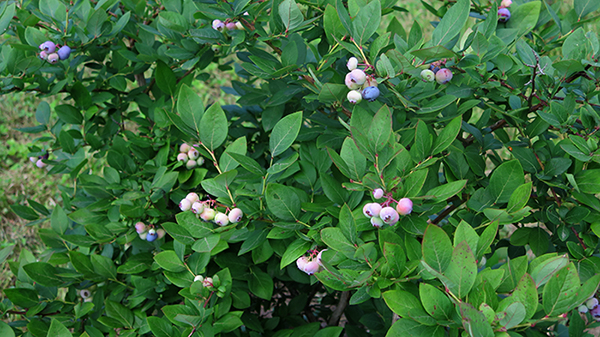
The orchard has more than 60 variety of edible or fruiting trees, bushes, and flowers, such as these blueberries. | Limestone Post
Now in its eighth year, the BCO’s initial acre in Winslow Woods Park has filled. While quicker crops like blackberries and raspberries have offered snacks at the BCO for years, a wide variety of fruit trees are just now nearing maturity and large-scale harvests. The number of peaches, plums, apples, crab apples — even jujubes — that the trees can hold are growing quickly. (The orchard has more than 60 variety of edible or fruiting trees, bushes, and flowers.) In the meantime, the organization not only keeps the orchard site growing but has never stopped planting, by helping others plant fruiting trees throughout Bloomington. The BCO has also developed programming to position itself as a source of skill sharing and community building, bringing hundreds of volunteers to the site every year.
Each summer at the BCO, volunteers watch the peaches ripen. In June, we thin fruit. In July, we pull the diseased fruit and monitor health. Then, there is the thrilling workday where we gather and say, “Next week! Next week, there will be loads of ripe peaches to harvest and share.”
And then, the peaches are gone. No pits on the ground. No fruit still ripening. No sign of when or how or by whom. This has been the most fascinating moment to watch in the seven years I’ve been involved with the orchard.
In the moment of the vanishing peaches, reactions are mixed. Initial reactions of I would have liked a peach. Who would take so many? mingle with The peaches are here for anyone. Conversation settles somewhere near I hope they were all put to use. I hope they got peaches that were ripe and ready to be enjoyed. Many of the volunteers return to their work, noting that the peaches weren’t why they came to the BCO. They don’t volunteer for a share in the harvest. They volunteer so the community can harvest.
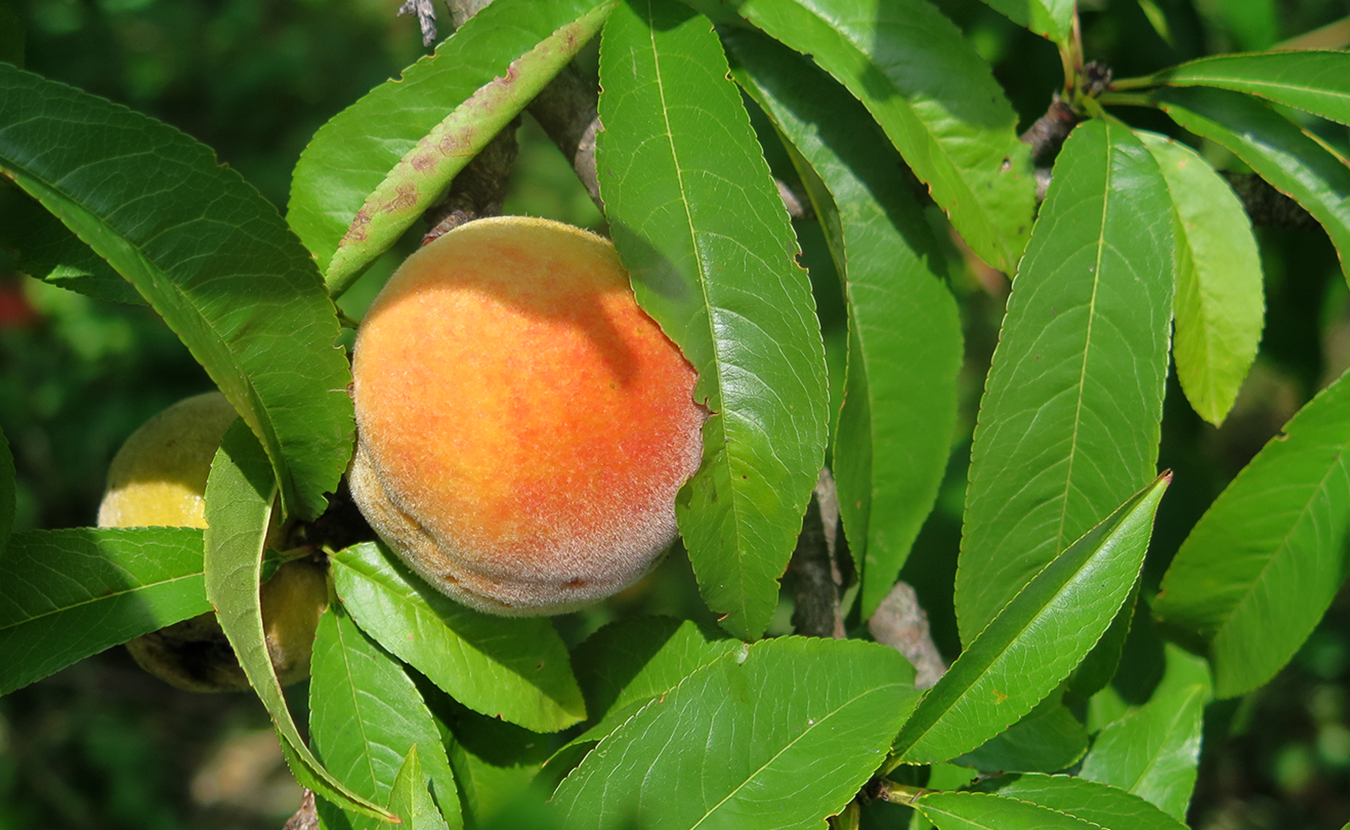
It’s almost peach season at the BCO. But in years past, according to volunteer Megan Betz, the peaches mysteriously disappeared almost overnight. | Limestone Post
After several years of this happening, both at the BCO site and at several of their partner planting locations, a rising hunch is that the peaches are picked by a combination of squirrels and raccoons, who track the fruit as closely as we do. But if it’s not? Well, that’s okay, too. While no formal plan for sharing the harvest has been laid out, both organizational leadership and volunteers on the ground agree that getting the harvest taken — and eaten — is much preferred to too little harvesting that leaves fruit rotting on the branch.
But the perennial question the organization faces still exists: “Who gets the fruit?” Its all-volunteer structure and openness to the public have made this, at times, a contentious issue. Does the orchard face overharvesting by some community members? If so, is this theft? Or, as some like Countryman argue, does running out of fruit simply mean our community needs more fruiting trees?
Educational and celebratory events, from workshops on pruning to the annual Cider Festival, bring folks to the orchard to learn how to grow fruit trees throughout the city. Classes (offered free of charge), along with annual fruit tree giveaways, and a near-endless supply of strawberry and blackberry plants, mean those able to access both the BCO and a bit of land can start fruit production at home for no cost. The BCO increased these efforts several years ago through the introduction of Partner Plantings.
“The Partner Planting program is a branch of the orchard that works with other organizations, businesses, and community members to expand the orchard’s mission into more local, publicly accessible spaces,” says Ashley Thomas, who manages the program. The program provides free fruit trees, a tree-planting demonstration, and a care manual to help those tending the trees after planting. The program has partnered with groups of neighbors, planting across lawns to pool their space and harvest, as well as larger institutions, from schools and student groups to churches.
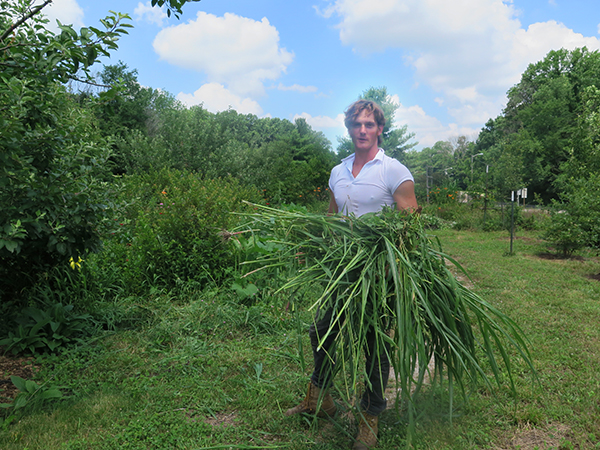
Volunteer Erik Anderson leads a work and learn day at BCO on a recent Saturday. | Limestone Post
Each Partner Planting is a site of community formation. “People gather to plan, plant, weed, prune, harvest,” says Thomas. “Then it tends to spread into the yards of people who want to do a little more than what’s provided at that site. It starts to grow with the community that it’s providing for, and therefore becomes the community.” Partner Plantings also become, as Thomas describes them, “a bridge between [the BCO] site and community,” sharing fresh, local fruit within more areas of the community than a single acre could manage.
In the BCO’s development from an acre of grass to an education-focused, polyculture orchard, the harvest itself has become less central to how the organization defines the outcomes of its work. With so many opportunities to grow, harvest, and connect, the success of the orchard site isn’t attached to the size of its harvest, but how widely its roots spread through our community. Now, as plantings establish on all sides of town and beyond Bloomington, those roots are taking hold and continuing to stretch. This year’s peaches may vanish, but more communities — your neighborhood, church, or school — are coming together to keep the next crop of peaches growing, working together to tend trees and, in the process, each other.
[Editor’s note: The Bloomington Community Orchard is located at 2120 S. Highland Ave. in Winslow Woods Park. Through the summer, drop-in work and learn days are held on Wednesday afternoons from 5 to 8 p.m. and Saturday mornings from 9 a.m. to noon. The BCO is also open to the public during park hours, 5 a.m. to 11 p.m.]

